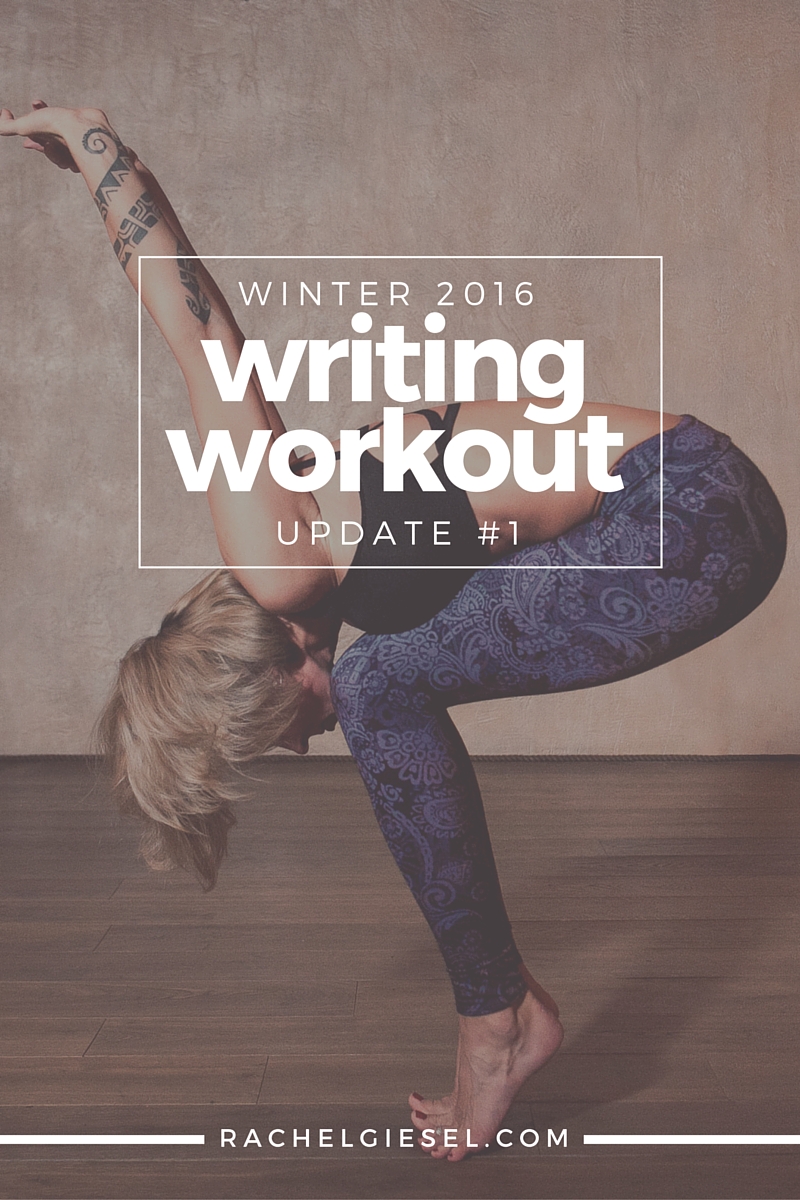Gosh it feels so good to get back into a routine! I have had the best week I’ve had in a long time simply because I’ve been getting back to what I love: reading and writing. Here’s what I’ve been up to this week, just in case you’d like to follow along in this writing workout with me!
What I Read:
Craft Essays:
Annie Dillard: Write Till You Drop
Dillard articulates beautifully why we each must write our own, personal stories: “Why do you never find anything written about that idiosyncratic thought you advert to, about your fascination with something no one else understands? Because it is up to you. There is something you find interesting, for a reason hard to explain. It is hard to explain because you have never read it on any page; there you begin. You were made and set here to give voice to this, your own astonishment.”
She also knows the necessity of paying attention to the masters of literature who have come before us: “The writer studies literature, not the world. She lives in the world; she cannot miss it. If she has ever bought a hamburger, or taken a commercial airplane flight, she spares her readers a report of her experience. She is careful of what she reads, for that is what she will write. She is careful of what she learns, because that is what she will know.”
She reminds us that it’s essential to ignore perfectionism and just write what we want to be writing. It’s just words, after all. Just sentences that add up to something fantastic: “It is no less difficult to write sentences in a recipe than sentences in ”Moby-Dick.” So you might as well write ”Moby-Dick.”
The beauty of falling in love with your story, and the misery of it: “The sensation of writing a book is the sensation of spinning, blinded by love and daring. It is the sensation of a stunt pilot’s turning barrel rolls, or an inchworm’s blind rearing from a stem in search of a route. At its worst, it feels like alligator wrestling, at the level of the sentence.”
And the importance of the now: “Do not hoard what seems good for a later place in the book, or for another book; give it, give it all, give it now. The impulse to save something good for a better place later is the signal to spend it now. Something more will arise for later, something better.”
Joan Didion: On Keeping a Notebook
Didion says the writer’s notebook is private and personal and will ONLY make sense to you: “Keepers of notebooks are a different breed altogether, lonely and resistant rearrangers of things, anxious malcontents, children afflicted apparently at birth with some presentiment of loss.”
When you’re “bankrupt” of ideas, your notebook can save you: “I will simply open my notebook and there it will all be, a forgotten account with accumulated interest, paid passage back to the world out there…”
Didion believes the point of the notebook is to remember the feelings a particular moment or person or scene invoked. She tries to “Remember what it was to be me: that is always the point.”
And those little tidbits of dialogue or setting description? They may not even be necessary in the story. The line could exist only to remember what else it involved. She says, “Not that I should ever use that line, but that I should remember the woman who said it and the afternoon I heard it.”
Matthew Fogarty: Writers on Writing #82
Fogarty on realizing the importance of committing to his dreams: “I’d finally persuaded myself that it was more important to risk failing at doing what I at last realized I loved than to continue to hate myself for the life I wasn’t living.”
Story-writing can be heart-breaking because it naturally comes with an erasing, a carving way. You must learn to remove the unnecessary, which could’ve been necessary, had different choices been made: “There’s something about starting a story that feels vaguely destructive. Like there’s this entire everything of possibility that’s erased as the novel is written, one choice at a time. Like the writing of the novel progresses from impossibility to possibility to certainty, at each step pulling words, ideas, characters, events, story out of the impossible and into the possible and then, when it comes time to affix words to page, pulling them from the possible and into the certain, all the while killing off all else that might have been possible, that might have been certain had I chosen differently.”
Foggarty on the element of surprise: “Stories exist in a world, characters are real people in that world with real agency in that world. There’s no way I can know what a person would do until I get to it. Create a character that’s a real person, put him/her/it in a situation, and let him/her/it surprise. If I’m not surprised by anything in the story when I’m writing it, there’s no chance the reader will be surprised and surprise is the thing. Surprise means interest and emotional investment which equals a story that exists in more than just the pages or plot that I’ve written, that resonates beyond the page.”
And, since there will never be a good time, we all might as well start now: “I think there’s no right time to start, no anything that you need to have figured out, that the right time is now, that a novel isn’t written in a day or in a draft but in a while and in a life and the only way to overcome impossibility is to prove the possible and in this case, the possible is only possible by writing. It may not be perfect in the beginning and it may not be perfect in the end but we’re not perfect ourselves — the condition of all mankind is imperfection and impossibility. But imperfection and impossibility can be cured by dedication and possibility and heart and joy. All we have are our words and our will and there’s no way to write the world without either, no way a novel is possible without both. So I might as well start now.”
Chitra Divakaruni: Writers on Writing: New Insights Into the Novel? Try Reading 300
Divakaruni compares the novel to a bell, which I find fascinating: “The successful novel, on the other hand, has a shape much like a bell. We begin at the top of the bell, its tight curve. Every detail has purpose here: the way a woman tilts her head, the slant of light as one exits the subway, the repetition of a phrase. As soon as we have gained our bearings, we notice things beginning to open up, flaring outward the way a bell does.”
“But after the first 50 pages or so, in many novels there was a downhill rush. (Was this because the initial energy was difficult to maintain? Or because — particularly in the case of first-time writers — the beginning had been workshopped and polished many times, but not the later portions? Or because the novel was sold on the strength of its first few chapters, after which the writer slackened off and the editor didn’t care?) The unsuccessful novel reminds me of a top that has been spinning for a while. One can see the chapters begin to wander in loose, uneven circles. Pacing grows shaky. Events are rushed through, so that they are a mere catalog of plot happenings, or scenes lose momentum as the narration gets snagged on an idea. Characterization becomes wobbly. Motives do not convince. Actions no longer reveal new dimensions of personality. Language falters. And finally the novel topples over into a contrived or commonplace ending and comes to a skittery halt.”
“It is this resonance, finally, that separates the successful novel from the others. The cast of major characters may be small or large, clowns or kings. The backdrop may be modest (a room) or ambitious (a continent). The vocabulary may be simple or flamboyant, literary or colloquial. The melody may be created by a single flute, or performed by an entire orchestra. But through it all, there’s a sense that what we’re seeing is not all that this is about.”
The Guardian: Rules for Writing Fiction Part 1 & Part 2
Burroway Sections 1 & 2
Blogs:
- Lucy Flint’s Fall in Love with Your Writing Series
- Eva Deverell’s Creative Writing Syllabus and The One Page Novel Scene Spreadsheet
Literature:
- Elena Ferrente
- George Saunders (my favorite): Mother’s Day
- “Rain coming. What a drag. She’d be stuck inside all day. Across Pine, the Denisons’ sunflowers were bending in the breeze. Alma and what’s-her-name were standing hunched over like a couple of lady trolls. Mom troll and daughter troll, out on the troll town. On Troll Mother’s Day. How nice. How sweet. How weird.”
- Erin Kate Ryan: 16 Things That are True (Glimmer Train #90)
- Ann Lamott’s Section 1
What Prompts I Followed:
- Write a story that begins and ends with a bicycle – This turned out so much more interesting than expected!
- Object of Wonder Prompt from How Writers Write Fiction:
- This is a multi-step prompt, designed to be completed in order with each piece gradually building on the piece before it.
- Detail the object’s descriptions. Consider origins, birth, relatives, what it’s purpose is, or what it could be, future renditions of it, purpose in the home, emotions.
- Have the object cause a fight between two characters. The conflict is regarding the object – it’s emotions, it’s position or location. Each of the characters wants something different from the object, and this causes the conflict. As the argument progresses, consider the objects history, fears, purpose etc. and make them part of the argument.
- The argument must settle somehow, whether it’s resolved or left unfinished is up to you. But let the object help settle the argument in some way.










